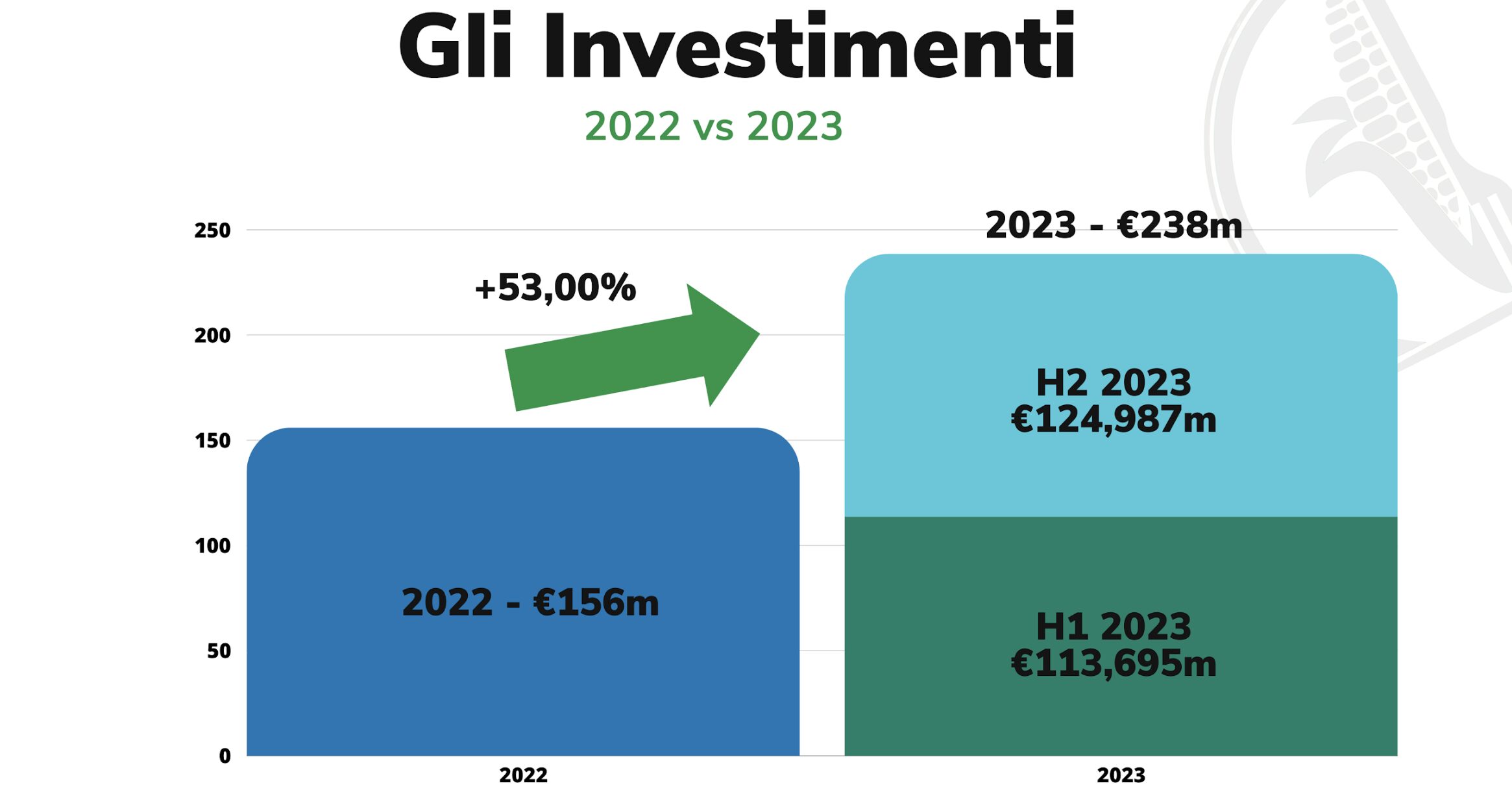238.6 million euros were invested in 2023 in Italian startups and scaleups innovating in the foodtech sector, a figure that represents a growth of 53% compared to the previous year’s numbers.This is the main data revealed by the report “Investments in agrifood-tech in Italy” published by the consulting firm TheFoodCons. These are numbers that take on an even greater value if we consider that in general investments in startups in Italy show a contraction between 2022 and 2023 as reported in the report by Italian Tech Alliance and Growth Capital which records a decline of 37%. The real star of 2023 was debt, which at €95.2 million absorbed 39.9% of investments in the past year. This is followed by the A rounds with 55.1 million euros, 23.1% of the total, although down 5.7% compared to 2022. B rounds increased (+5.1%) to 31.5 million in 2023, accounting for 13.2%. Round C decreased (-36%), which in 2023 stood at €26.9 million, 11.3% of the total. Slight changes for seed (€11 million, +0.9%) and pre-seed (€3.4 million, +9.1%), although in Italy the boundary between the two is always difficult to identify. Good news also from the crowdfunding (€14.5 million, +19%) Editor’s note: Here emphasis should be placed on the fact that the analyses on investment rounds on startups that examine the entire scenario look exclusively at equity transactions, in the case of the numbers in the report cited here the share, which is also the majority, of debt investments is also taken into account and therefore it is appropriate to carefully consider the data if you intend to make a comparison between the performance of the specific sector examined here and the trend general.
Sub-sectors
Half of the investments, just over €120 million, 50.3%, up 97.5% compared to 2022, was concentrated in agritech, especially indoor farming (€109 million). There was also excellent growth (+88.7%) in the restaurant-tech sector, which with 34.6 million euros accounted for 14.5% of the total. Good results from a “difficult” sector in Italy, that of innovative foods, with 10.3 million euros of investments, up 146%. Very bad news for digital food, which plummeted by 93.2%, with 3.3 million euros. Amazing performances both for food retail, with 42.5 million euros, +741.6%, although some data have not been confirmed, and for the miscellaneous category, with 26.6 million euros, +870%. “This year’s data, which are in some ways against the tide,” says Antonio Iannone of TheFoodCons in a statement, “send an important signal and put foodtech forward as a driving force for innovation in our country. Even if the road is long and full of obstacles in the social, political and financial fields, Italy has all the credentials to become a center of excellence also in the field of agri-food innovation, a very valid and essential ally to keep Italy at the top of world food. If we consider that in 12 months investments in Italy have gone from 0.5% to 2.3% of the total globally, we can probably say that the premises are more than good. If I had to bet on a single sector, I would focus on agritech, considering that our country can count on scaleups that are already European and world leaders in their respective sectors, such as xFarm, Cynomys and The Circle”. “The results of the report are encouraging,” says Matteo Vanotti, CEO of xFarm Technologies, “Agrifood-tech continues to be a fast-growing sector. In this context, the goal of xFarm Technologies is both to continue to grow internationally by applying AI and Regenerative Agriculture to the entire supply chain, and to drive innovation ecosystems related to the agritech sector”. “In agritech,” says Massimo Montecchi, CEO of IFarming, “there is no specialized ‘fund’ for Italy to date. The significant growth in investments in vertical farming bodes well for our sector, even if more courage is needed to push innovative technologies, such as ours, in agriculture/animal husbandry. We hope that the birth, I believe imminent, of specialized ‘funds’, will give this courage that is missing and make innovative agritech startups grow” “In a difficult year for innovation ecosystems – adds Marco Gaiani, partner of Linfa Ventures – Italian agrifoodtech has paradoxically confirmed its resilience. Headwinds were not and will not be, few: a terrible risk aversion in investments; a political climate that is not always favourable; some scaleups that are wobbly, maybe the ones that have been talked about more recently. Yet the impression is that of an ecosystem that holds up and evolves. This is demonstrated by the resilience of investments, including debt that has often filled the stagnation of equity investments, the number of deals in the seed and pre-seed phases, the development of startups in some verticals where Italy can have its say; Personally, I’m betting on restaurant tech. Of course, the challenges remain enormous. Internationalization, in the double dimension of international growth for startups and attraction of foreign investors. The challenge and opportunity of AI. The realization of some really relevant exits. However, we at Linfa believe that there are ideas and teams, and that with capital and know-how this ecosystem can accelerate and finally become mature”. The report can be downloaded at this
link
ALL RIGHTS RESERVED ©
